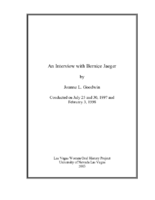Search the Special Collections and Archives Portal
Search Results

Transcript of interview with John Acres by Stefani Evans and Claytee White, July 11, 2017 & September 28, 2018
Date
Archival Collection
Description
Visionary John Acres likes to use his engineering background and computer expertise to solve problems. He has sold more companies that most people ever form—Electronic Data Technologies, Mikohn Gaming, and Acres Gaming—and he still owns the Acres 4.0 and Gen Seven companies. The 2016 Inductee to the American Gaming Association and the University of Nevada Las Vegas Gaming Hall of Fame reshaped the gaming industry by inventing electronic player tracking, progressive jackpot systems, and loyalty programs. Each innovation focused on customer service—"what would the customer think; what would they like; what would really get them excited; what would get them to come back"—and harkened back to lessons taught him by Norman Little, manager of Mr. Sy's Casino of Fun and one of the first people to hire a teenaged John Acres. In this interview, Acres bookends his remarkable career in gaming with the customer service philosophy of Norman Little as the basis, culminating with solutions to enable g
Text

Transcript of interview with Stavros Anthony by Claytee White and Stefani Evans, July 24, 2017
Date
Archival Collection
Description
Born of humble beginnings to a sheep farming family in Cyprus, Greece, Stavros Anthony embodies the legacy of the American spirit and ability to reach as far as one can to achieve personal greatness. His family came to the United States in 1955 and moved to Kansas City, Missouri, where his father started working in the restaurant business as a cook until 1967. Moving to Detroit proved to be a benefit for the family, as his father became the executive chef for the Grosse Point Yacht Club, one of the most exclusive clubs in the country. He went from sheep herding, to peeling potatoes, to the executive and afforded his family a typical middle class lifestyle. He graduated from high school in 1975 and attended Wayne State University, earning is B.A. in criminal justice and starting his career in policing with the university’s police department. Upon graduating in 1980, he faced a frozen job industry in Detroit due to a very bad auto recession. He applied for and secured a position as a po
Text

Transcript of interview with Ron M. Portaro by Stefani Evans and Claytee D. White, July 27, 2017
Date
Archival Collection
Description
Most Las Vegas residents like living in Southern Nevada, but few make the leap of faith that Ron M. Portaro did in 1994. The business and development consultant gave up a "tenure-track, full time, full-benefits, kids-could-go-to-college-for free job" to keep his family in Las Vegas. He had no local job, so he commuted twice a month to the Cleveland and Toledo areas for two years to complete the consulting assignments that fed his young family. As the Ohio native discusses the dysfunctional family into which he was born and was raised, he also talks about forging his own path as an overachiever, about going to college at Penn State at Altoona on a mining engineering co-op program with Morton Salt, working six months out of the year in the salt mines and attending classes the other six months. After transferring to the University of Toledo, he formed his own painting business to pay his tuition and graduated in management in 1978 and earned his JD and MBA in 1981. His mentor at University of Toledo asked him to teach labor management. While teaching labor relations he also began representing athletes as a player agent in the National Football League and the United States Football League back in the day and the Canadian Football League. From there, he became associate director for the Northwest Ohio Center for Labor Management Cooperation at the University of Toledo and later with the Cleveland State Labor Management Center. It was with the latter that he learned the benefits of the BUILT-RITE model of business relations to promote cooperation between and among the building trades, contractors, and owners. In this interview, Portaro speaks to the BUILT-RITE model for cooperation, his 1993 move to Las Vegas and fortuitous meetings of Pastor Paul Goulet of the International Church of Las Vegas, City of Las Vegas councilman Arnie Adamsen, and Charlie Kajkowski of the Las Vegas Public Works Department. He reveals how these connections eventually not only shaped Portaro's life in Southern Nevada; they also enabled him to turn his life experiences, education, and skill set to benefit his church, his family, and his adopted community. The commitment Portaro made in 1994 to remain in Las Vegas has benefitted Southern Nevada tourists, residents, and business owners in countless ways we can appreciate only when we stop to think about how many people had to cooperate and communicate to make our large infrastructure projects come to fruition.
Text

Transcript of interview with Stan Irwin by Cork Proctor, October 24, 2003
Date
Archival Collection
Description
Stan Irwin shares details of his background, family, and early show business experiences. His life story spans many decades and includes attending NYU, doing stand-up comedy, flying during WWII, working at Club Bingo in Las Vegas, and building up the entertainment at the Sahara Hotel. Mr. Irwin comments on many aspects of the Las Vegas entertainment scene. He recalls many headliners that he worked with and shares anecdotes about several. The Beatles, Johnny Carson, Dinah Washington, Billie Holliday, Lena Home, and Pearl Bailey are just a few of the many outstanding performers that he brought to Las Vegas. Stan offers comments on racism in Las Vegas thirty and forty years ago, and gives his opinions on the Mob, Howard Hughes, prostitution, and dress codes in the fifties and sixties, among other things. He recalls how Las Vegas looked in the early days, mentions a cardiovascular health project for children that he's involved with today, and gives a little insight into staying fit at eighty-plus.
Text

Transcript of interview with Kevin T. Orrock by Claytee D. White, December 04, 2015
Date
Archival Collection
Description
Kevin T. Orrock, president of Summerlin and vice president of Master Planned Communities for The Howard Hughes Corp., has come full circle. Born in Pioche, Nevada, he spent his early years in the San Francisco Bay area and in Pittsburgh, Pennsylvania. Graduating from a small liberal arts college, he arrived in Las Vegas in 1974 with a degree in accounting and a teaching credential, finding work in the Desert Inn accounting department. Howard Hughes owned the Desert Inn, so from 1974 Orrock has consistently been in the employ of Howard Hughes, Summa Corporation, and Howard Hughes Corporation. Orrock later earned his M.B.A. at UNLV. In this interview, Orrock focuses on Summerlin, the 22,000-acre, award-winning, master-planned community on the west side of the Las Vegas Valley. He discusses Summerlin’s physical layout, its history, its development, and its future. He specifically credits Summa Corporation’s early visionaries John Goolsby and Will Lummis for having the foresight to sell some of the company’s land in order to build the financial foundation that, in turn, permitted Summerlin’s fifty-year development plan. He also talks about the development and future of Downtown Summerlin; its balance of private, charter, and public schools; and the ways the company selects its residential builders.
Text

Transcript of interview with Bernice Jaeger by Joanne L. Goodwin on July 25, 1997, July 30, 1997, & February 3, 1998
Date
Archival Collection
Description
Interviewed by Joanne L. Goodwin. Bernice Smith was born in Cincinnati, Ohio, on July 27, 1934. She married Ivan Jaeger in 1955. He and his family were involved in the underground gaming industry in the Midwest. When it shut down in 1961, they moved to Las Vegas where Ivan worked first as a dealer and later in various executive gaming positions. Bernice was one of the fist students to attend Clark County Community College (later Community College of Southern Nevada) when it was founded in 1971. She earned a liberal arts degree in 1973 and a degree in hotel administration in 1974. Bernice worked as the secretary of Inez Rambeau, the director of convention sales at the Riviera Hotel and Casino. After a few years, she became the assistant of the hotel director at the Riviera. Later Bernice was the personal secretary to the owner and general manager of the Aladdin Hotel and Casino. She left that position in 1984, completed a bachelor's degree in the field of women's studies, and started Flex-Time, a temporary employment agency catering to working women. Then she was hired by Ira levy, the new owner of the Continental Hotel and Casino to be his assistant general manager. In 2003 Bernice earned a master's degree in counseling at the University of Nevada, Las Vegas, and she now works for Legal Rehabilitation Services, leading court-mandated group counseling for people in domestic violence situations
Text

Transcript of interview with Florence McClure by Joanne Goodwin, January 24, 1996 & February 6, 1996
Date
Archival Collection
Description
Florence McClure came to Las Vegas later in her life, but the state felt her presence and the community her contributions as if she were a native daughter. Introduced to the League of Women Voters in 1967, McClure met her political mentor Jean Ford and learned how to practice the core elements of democracy. She put those tools to work in a number of ways, however her participation in the creation of the Rape Crises Center and her advocacy for locating the women’s prison near Las Vegas are two of her long-lasting efforts. Florence Alberta Schilling was born in southern Illinois where she enjoyed the security of a tight-knit family and the independence to test her abilities growing up. She graduated from high school and attended the MacMurray College for Women at Jacksonville. With the attack on Pearl Harbor in 1941, she began a series of jobs working for the war effort. She moved to Ypsilanti, Michigan with a girlfriend to work at the Willow Run Army Airbase and then moved to Miami, Florida where she worked for the Provost Marshall in the Security and Intelligence Division. She met her husband, James McClure, at the time and they married in 1945. During the next several years, they raised a family and moved around the country and to Japan with the military. McClure came to Las Vegas in 1966 as part of her work in the hotel industry which she engaged in after her husband’s retirement from the military. She had worked in California and Miami Beach, but it was Burton Cohen in Los Angeles who invited her to join him in a move to Las Vegas to build the new Frontier Hotel and Casino. Following the completion of the Frontier, she moved to the Desert Inn with Cohen in 1967 and worked as the executive office manager. After a few years, she decided to leave the industry and complete her college education. She graduated from UNLV in 1971with a BA in Sociology with an emphasis on criminology. She was 50 years old. McClure had been a member of the League of Women Voters for a few years at that point and had learned the political process from Jean Ford and workshops on lobbying. She had numerous skills that were waiting to be tapped when she attended an informational meeting on the incidence of rape in the Las Vegas valley. From that meeting, a small group of individuals, including McClure, began the organization Community Action Against Rape (later renamed the Rape Crisis Center) in 1973. It was the first agency in the area devoted to serving individuals who had been assaulted and changing the laws on rape. The organization’s first office was set up in McClure’s home. Over the next decade, she worked to change attitudes and reshape policy by constantly raising the issues of sexual assault with police officers, emergency room doctors, judges, and legislators. Her role as an advocate took her into hospital emergency rooms and courtrooms to assist victims. It also took her to the state legislator to lobby repeatedly for a change in laws. During this period, journalist Jan Seagrave gave McClure the nickname “Hurricane Florence” - a fitting moniker that captured the force with which McClure attacked the issue. As a result of her efforts and those of the people with whom she worked, we now 1) recognize rape as a crime of assault; 2) forbid the sexual history of a rape victim from being used against her in court; and 3) recognize marital rape. In addition to learning about Florence McClure’s activities, the reader of this interview will gain information on the role of civic organizations like the League of Women Voters in engaging the voluntary efforts of women in the post-war years.
Text

Transcript of interview with Valerie Wiener by Barbara Tabach, January 20, 2015
Date
Archival Collection
Description
Valerie Wiener is an accomplished state senator, business owner, president and founding member of the Public Service Institute of Nevada and the Valerie Wiener Foundation. She was born October 30, 1948 in Las Vegas, Nevada. Her service as senator for 16 years and her role as a public servant led her to become the first woman assistant majority leader of the state senate in Nevada. She graduated with a bachelor degree of Journalism at the University of Missouri/Columbia within the School of Journalism earning a Masters of Arts in Broadcast Journalism and a Master of Arts in Literature at the University of Illinois in Springfield while attending law school at McGeorge School of Law in Sacramento in the 1970s. Her generosity is also seen through scholarships and activities at the Louis Wiener Jr. Elementary School. In addition, Valerie is a professional speaker, consultant, and internationally published author. She is the recipients of many awards, such as: ?Women of Achievement Award? in Media; ?Healthy Schools Heroes?; ?Public Affairs Champion Award?; ?Legislator of the Year?, and the Nevada Secretary of State?s recipient of the ?Jean Ford Participatory Democracy Award.? She stays active through her commitment to the Nevada Senior Olympics for both Fitness and Weightlifting earning 17 gold medals from 1998 to 2007. In this interview, Wiener discusses her childhood and being raised in Las Vegas in the 1950s as well as the academic path that led her career into politics. She shares memorable insight into the life of her father, Louis Isaac Wiener, Jr., an accomplished attorney and business man who represented the infamous Benjamin ?Bugsy? Siegel during the construction and opening of the Flamingo Hotel and Casino in 1946. Throughout Wiener?s interview, she highlights the traditions of the small, but growing Las Vegas Jewish population in the 1960s. Among the people she recalls most vividly is her grandmother Kitty Wiener. Wiener also discusses her community service work and her life mantra of giving.
Text

Transcript of interview with Lynn Leshgold Rosencrantz by Barbara Tabach, January 7, 2016
Date
Archival Collection
Description
In this interview, Rosencrantz discusses at length her involvement as a founder of the city?s Jewish Federation?s Young Leadership Program, including other local leaders she worked with to promote Jewish community engagement in Las Vegas. She also talks about her spiritual journey as an adult, leading to her participation at Stillpoint Center for Spiritual Development.
Text

Transcript from interview with Mike Unger by Barbara Tabach, January 21, 2016
Date
Archival Collection
Description
In this interview, Unger reflects upon his long and successful career in hotel management in Las Vegas and also in Arizona and Pennsylvania. He shares stories as a local celebrity, particularly in the 1970s and 1980s when he worked at Caesars Palace, as well as the big projects he oversaw, including organizing the first big fight nights, World Series of Tavern Poker and Grand Prix race. He talks about working with Morris Shenker, Moe Dalitz, Cliff Perlman and Billy Weinberger, and the role of the Jewish community in the city, and specifically in the gaming industry. Unger also discusses his non-gaming industry ventures which have included a satellite communications business and a bagel business.
Mike Unger was born in Queens, New York in 1947, and spent most of his childhood in Long Island, growing up in a predominantly Jewish and Italian community. As a young adult, Unger was already working hard, running one of his family?s restaurant after school. When he was in high school, his family moved to Los Angeles to accommodate his father?s health needs, and eventually end up in Las Vegas by 1967. Over the next two decades, Unger would work at nine properties in the city. Unger is one of the University of Nevada, Las Vegas? first hotel management graduates, and started his career with Summa Corporation in its management training program at the Frontier Hotel and Casino. After a brief stint at the Airport Marina Hotel in Los Angeles in 1972, Unger returned to Las Vegas, serving in management capacities at the Aladdin Hotel and Casino, Summa Corporation headquarters and Landmark Hotel and Casino. In 1978, he joined Caesars Palace Hotel and Casino management team, and was integral in creating the city?s first large boxing events, the World Series of Tavern Pool, and the Grand Prix race. Unger also ran properties for the White Mountain Apache and Colorado River Indian Tribes in Arizona, as well as the Showboat Hotel and Casino. In this interview, Unger reflects upon his long and successful career in hotel management in Las Vegas and also in Arizona and Pennsylvania. He shares stories as a local celebrity, particularly in the 1970s and 1980s when he worked at Caesars Palace, as well as the big projects he oversaw, including organizing the first big fight nights, World Series of Tavern Poker and Grand Prix race. He talks about working with Morris Shenker, Moe Dalitz, Cliff Perlman and Billy Weinberger, and the role of the Jewish community in the city, and specifically in the gaming industry. Unger also discusses his non-gaming industry ventures which have included a satellite communications business and a bagel business.
Text
